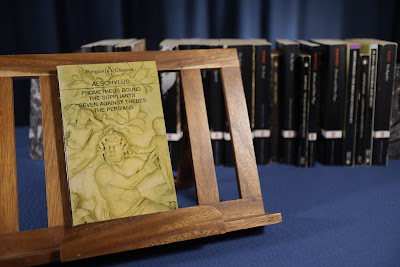The Story
The Persians centres around a chorus of old men of Susa, the Persian capital. As they wait to hear about the Persian invasion of Greece. Atossa, Xerxes mother, has a vision that suggests that the Persians will be defeated. She then sacrifices to the Gods for their safe return and sees another bad omen.
A messenger enters, and tells of the Persians defeat at Salamis, and of the death of many great and mighty Persians, which he takes the time to name. He then reveals that Xerxes survived but that the force was scattered and that he does not know where he or any of the others are.
Atossa, with the chorus, then summons the shade of Darius. Who, when told of Xerxes defeat, condemns his son's decision to go to war and to build a bridge across the Hellespont; that the bridge angered the gods and that's why he was defeated. He also prophesise another major defeat for the Persians.
Xerxes arrives in tattered clothes and, with the chorus, laments over the defeat of the Persians.
Reflections
This is the first work that has mentioned the Persians but I expect to see them again as they were a major player in the region.
Atossa's vision/dream is the source of all the tension in the play, as it gives the characters present a reason to be worried about the outcome of the fighting, in a present manor. Without it, there would, of course, be general worry and not knowing but these visions bring it to a head.
Comparisons
Again, as in Seven against Thebes all the action happens off stage and we only hear about it through the mouths of the messengers. This seems to be done for simplicity and it allows the plot to move quickly without cumbersome fight sequences.
Have you read The Persians? If so what did you think of it?
Want to read The Persians but haven't? Hopefully this inspires you to take the time to do so.
Get a copy of The Persians.
Get a copy of The Persians.









